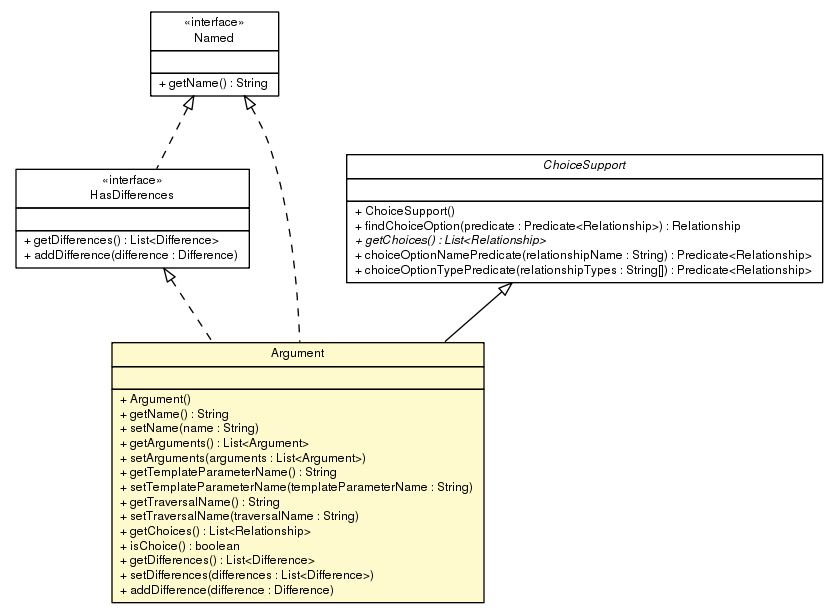
|
||||||||||
| PREV CLASS NEXT CLASS | FRAMES NO FRAMES | |||||||||
| SUMMARY: NESTED | FIELD | CONSTR | METHOD | DETAIL: FIELD | CONSTR | METHOD | |||||||||

java.lang.Objectca.infoway.messagebuilder.xml.ChoiceSupport
ca.infoway.messagebuilder.xml.Argument
public class Argument
The specific type argument for a template parameter.
When an interaction is defined, it is composed of various specific parts (e.g. the base message part) with template parameters specified by a particular template argument. This class models the information that is specified in the template argument.
For example, the parameters for Find Candidates look like this:
<mif:argumentMessage root="DEFN" section="IM" subSection="MC" domain="CI" artifact="MT"
realmNamespace="CA"
id="002100">
<mif:parameterModel parameterName="ControlActEvent" root="DEFN" section="IM"
subSection="MF"
domain="MI"
artifact="MT"
realmNamespace="CA"
id="700751"
traversalName="controlActEvent">
<mif:parameterModel parameterName="ParameterList" root="DEFN" section="AM" subSection="PR"
domain="PA"
artifact="MT"
realmNamespace="CA"
id="101103"
traversalName="parameterList"/>
Each parameterModel represents one argument.
| Constructor Summary | |
|---|---|
Argument()
|
|
| Method Summary | |
|---|---|
void |
addDifference(Difference difference)
|
List<Argument> |
getArguments()
Sub-arguments. |
List<Relationship> |
getChoices()
The possible choices when an argument is defined as an abstract type. |
List<Difference> |
getDifferences()
Records the differences between arguments of different release versions during regen. |
String |
getName()
The name of the type that the argument defines. |
String |
getTemplateParameterName()
The template parameter name. |
String |
getTraversalName()
Gets the traversal name. |
boolean |
isChoice()
Indicates that an argument is defined as an abstract type and has specific choices. |
void |
setArguments(List<Argument> arguments)
Set the sub-arguments. |
void |
setDifferences(List<Difference> differences)
|
void |
setName(String name)
Set the name. |
void |
setTemplateParameterName(String templateParameterName)
Sets the template parameter name. |
void |
setTraversalName(String traversalName)
Sets the traversal name. |
| Methods inherited from class ca.infoway.messagebuilder.xml.ChoiceSupport |
|---|
choiceOptionNamePredicate, choiceOptionTypePredicate, findChoiceOption |
| Methods inherited from class java.lang.Object |
|---|
clone, equals, finalize, getClass, hashCode, notify, notifyAll, toString, wait, wait, wait |
| Constructor Detail |
|---|
public Argument()
| Method Detail |
|---|
public String getName()
The name of the type that the argument defines. For example, a name might return "MCCI_MT700751CA.ControlActEvent".
getName in interface Namedpublic void setName(String name)
Set the name.
name - - the new name.public List<Argument> getArguments()
Sub-arguments.
Arguments can, themselves, have arguments. Usually used in the case of a control act type, the argument of which is the payload.
public void setArguments(List<Argument> arguments)
Set the sub-arguments.
arguments - - sets the sub-arguments.public String getTemplateParameterName()
The template parameter name. Each message part with template parameters will name the parameter (e.g. "RegisteredRole" or "Act"). This maps to the templateParameterName attribute of the parameterModel element
public void setTemplateParameterName(String templateParameterName)
Sets the template parameter name.
templateParameterName - - the new templateParameterNamepublic String getTraversalName()
Gets the traversal name. The traversal name is used to describe the element name when the message is rendered to XML.
public void setTraversalName(String traversalName)
Sets the traversal name.
traversalName - - the new traversal name.public List<Relationship> getChoices()
The possible choices when an argument is defined as an abstract type.
getChoices in class ChoiceSupportpublic boolean isChoice()
Indicates that an argument is defined as an abstract type and has specific choices.
public List<Difference> getDifferences()
getDifferences in interface HasDifferencespublic void setDifferences(List<Difference> differences)
public void addDifference(Difference difference)
addDifference in interface HasDifferences
|
||||||||||
| PREV CLASS NEXT CLASS | FRAMES NO FRAMES | |||||||||
| SUMMARY: NESTED | FIELD | CONSTR | METHOD | DETAIL: FIELD | CONSTR | METHOD | |||||||||